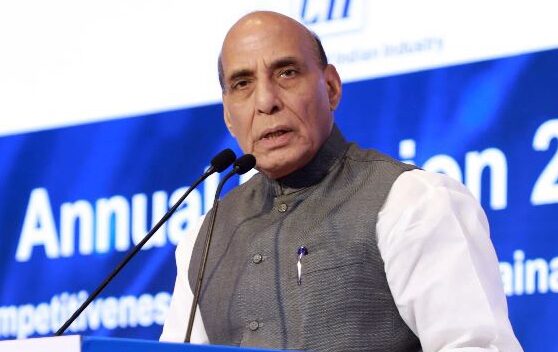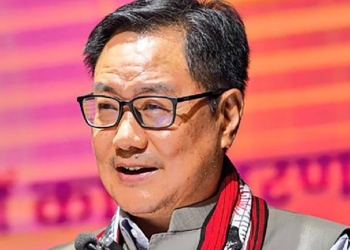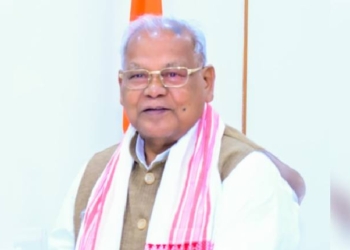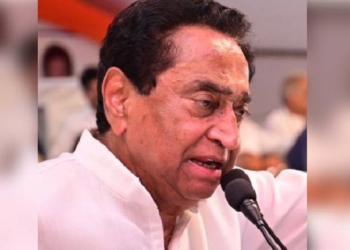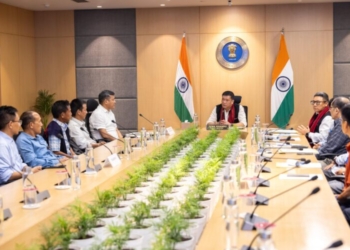New Delhi: Defence Minister Rajnath Singh has called upon the industry leaders to come up with innovative solutions to help India become a ‘leader’ from an ‘imitator’ in futuristic technologies, and stay prepared to deal with challenges emanating from the current global security scenario.
He was addressing the annual session of Confederation of Indian Industry (CII) in New Delhi Thursday. The theme of the session was ‘Future Frontiers: Competitiveness, Technology, Sustainability and Internationalisation’.
The Defence Minister asserted that in today’s era, security equations are changing at an unprecedented pace and countries are focusing more than ever on technological advancements in the fields of artificial intelligence, quantum computing and genetics etc.
He termed it as both a challenge of not lagging behind in the race of technology as well as an opportunity of making a mark, with the aim to help the nation leapfrog on the path of progress.
Rajnath Singh described Research & Development (R&D) in cutting-edge technology as the only way to achieve this goal, stating that it opens new dimensions crucial for the development and security of any nation in today’s times.
“We need to set new goals and achieve them through innovative methods to keep ourselves prepared to deal with any challenges arising out of the ever-evolving global situation. R&D has the ability to convert things, which are viewed as resources, into resources. Technology improves the utilisation of the available resources. It acts as a force multiplier,” he said.
The Minister stressed on the need for R&D to achieve excellence in various fields, including defence, health, education, agriculture, commerce and communication, stating that it can give the country an edge over the others. “To keep ourselves strong, we need to maintain our edge in these sectors. It will be possible only if we become technology leaders,” he said.
Singh pointed out that there are two faces to the technology paradigm across the globe — one of a leader nation which grabs an opportunity, innovates and invents a new technology and the other of an imitator which follows the leader.
Stating that new technological avenues are coming to the fore without any established leader, he exhorted the industry captains to strive to make India a technology leader from an imitator. He urged them to increase their in-house R&D funding and make inroads in new and untouched sectors, products, goods and services through new technologies.
The Defence Minister listed out the key requirements for a nation to become a technology leader, such as a substantial capital, a robust R&D infrastructure, demography as well as the ability to adopt, understand and create a base of previous technologies.
He stated that the government has taken a number of steps, such as banking policy, regulatory policy, providing funds, labour policy, education & health policy, which provide a playfield to the youth and the industry to work together and take R&D in the country to greater heights.
Singh also shared his insights on another dimension of technology, which he called ‘Socio-Economic Technology’, commonly referred to as governance. He was of the view that the country’s population, which was once considered a liability, is now being viewed as an asset.
“India is currently passing through a demographic dividend. Policies have been rolled out for the optimum utilisation of this population. We have strengthened the ease of doing business and ease of living in India through the socio-economic technology of good governance. Reforms have been made in the education and health sectors, which focus on making the population educated as well as healthy and skilled,” he said.
Emphasising that an educated and healthy manpower helps in increasing the productivity manifold, the Defence Minister exuded confidence that the government efforts will convert the demography into a ‘wealth creating resource’ from mere ‘wealth consuming entity’.
Singh described the youth as the most crucial aspect of the demographic dividend, stating that the continuous growth of startups in the country is a result of the potential, energy and enthusiasm of the young Indian minds.
“Today, there are about one lakh startups in the country; of which more than 100 are unicorns. Without much resources, our startups are competing with bigger entities with their passion. Our industries need to work with the same passion to compete with global giants,” he said.
In the context of Global Giants and Indian industries, he spoke about the ‘Technology incumbent Challenger model’, in which the challenger has more incentive to invent new technology.
“The global giants may be technology incumbents due to their superior technology; but our industry, which is relatively small, is a technology challenger. It will have more incentive to invent new technology,” he said.
(IANS)




